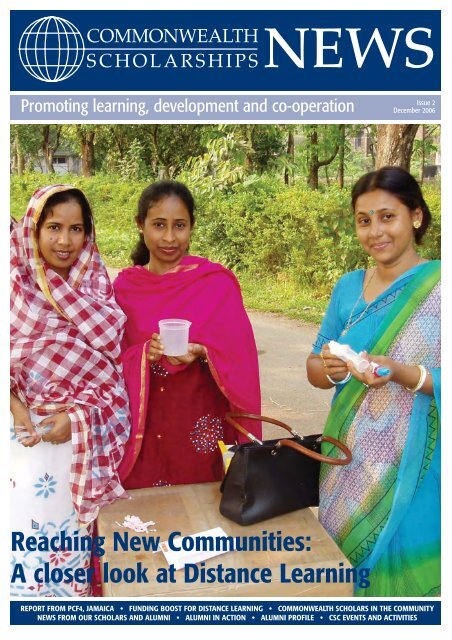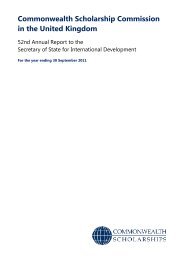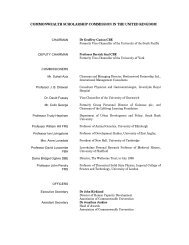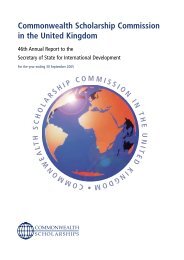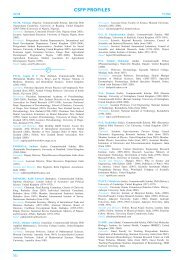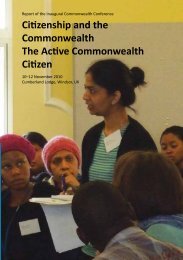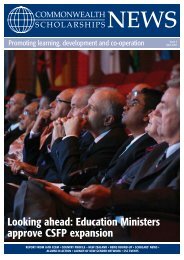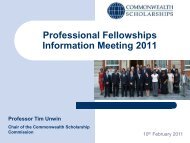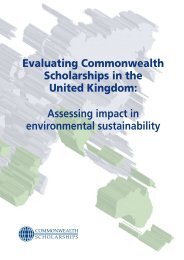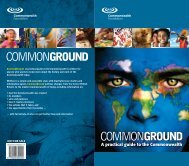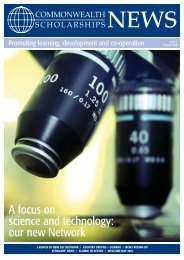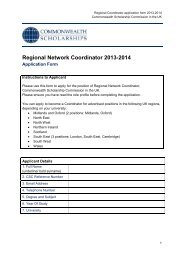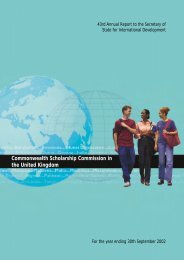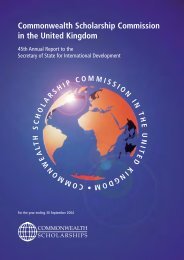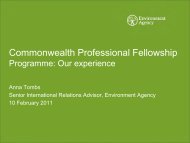Issue 2 - Commonwealth Scholarship Commission in the United ...
Issue 2 - Commonwealth Scholarship Commission in the United ...
Issue 2 - Commonwealth Scholarship Commission in the United ...
- No tags were found...
Create successful ePaper yourself
Turn your PDF publications into a flip-book with our unique Google optimized e-Paper software.
NEWSPromot<strong>in</strong>g learn<strong>in</strong>g, development and co-operation<strong>Issue</strong> 2December 2006Reach<strong>in</strong>g New Communities:A closer look at Distance Learn<strong>in</strong>gREPORT FROM PCF4, JAMAICA • FUNDING BOOST FOR DISTANCE LEARNING • COMMONWEALTH SCHOLARS IN THE COMMUNITYNEWS FROM OUR SCHOLARS AND ALUMNI • ALUMNI IN ACTION • ALUMNI PROFILE • CSC EVENTS AND ACTIVITIES1
THIS ISSUECoverThree <strong>Commonwealth</strong>Distance Learn<strong>in</strong>g scholarscomplet<strong>in</strong>g a water analysisexercise, as part of <strong>the</strong> MSc <strong>in</strong>Aquatic Resource Development(offered by <strong>the</strong> University of Stirl<strong>in</strong>g, UK <strong>in</strong>conjunction with Bangladesh AgriculturalUniversity, Mymens<strong>in</strong>gh, Bangladesh).2 – 3 News Round-UpThe latest from <strong>the</strong><strong>Commonwealth</strong> <strong>Scholarship</strong><strong>Commission</strong>.4 – 5 Scholars’ NewsNews, views and events of ourcurrent scholars.6 – 7 Pan <strong>Commonwealth</strong> Forumon Open Learn<strong>in</strong>g 4Report from latest conference<strong>in</strong> Jamaica8 Alumni <strong>in</strong> ActionAn update on <strong>the</strong> activities of ouralumni.9 Alumni ProfileEdward Bwengye-Kahororo,former Distance Learn<strong>in</strong>g scholarfrom Uganda10-11 Professional Networks andCSC EventsReports on recent networksem<strong>in</strong>ars and events12 Information about <strong>the</strong> CSFPand CSC contact details<strong>Commonwealth</strong> <strong>Scholarship</strong>s News(formerly Omnes)Editorial Team:Dr John Kirkland, Jocelyn Law, Anna O’Flynn,Sarah Humphreys and Natasha Lokhun.Design:John KirbyPr<strong>in</strong>t:DSI Colour Works<strong>Commonwealth</strong> <strong>Scholarship</strong>s News is publishedthree times a year by <strong>the</strong> <strong>Commonwealth</strong><strong>Scholarship</strong> <strong>Commission</strong>.EDITORIALDistance learn<strong>in</strong>g has become a significant strandof <strong>the</strong> <strong>Commonwealth</strong> <strong>Scholarship</strong><strong>Commission</strong>’s activity <strong>in</strong> <strong>the</strong> last five years, and isa particular focus of this issue. In 2005, 139 of <strong>the</strong> 501scholars who took up awards <strong>in</strong> 2005 were distancelearners. Through our distance learn<strong>in</strong>g schemes,scholars have been able to study a range of Mastersprogrammes offered by UK universities whilst liv<strong>in</strong>gand work<strong>in</strong>g <strong>in</strong> <strong>the</strong>ir own countries, and this hasopened up opportunities to many people who wouldhave o<strong>the</strong>rwise been unable to come to <strong>the</strong> UK for fulltimestudy. We are delighted that one of our alumni toProfessor Ann Floydhave studied <strong>in</strong> distance learn<strong>in</strong>g mode, EdwardBwengye-Kahororo, is contribut<strong>in</strong>g to this issue (AlumniProfile, page 9).Probably <strong>the</strong> most important characteristic that ‘distance learn<strong>in</strong>g’ courses share is that studentscan study for most of <strong>the</strong> time wherever <strong>the</strong>y happen to be. In many cases this means that<strong>the</strong>y can study part-time, and fit <strong>the</strong>ir studies around <strong>the</strong>ir work and family commitments.Some courses expect regular attendance for lectures/sem<strong>in</strong>ars on most weekends, with privatestudy completed dur<strong>in</strong>g <strong>the</strong> week. One course has a requirement to spend a term <strong>in</strong> <strong>the</strong> UKwhen students study full-time. O<strong>the</strong>r courses have no attendance requirement at all, but offerscope for face-to-face tutorials for those who are <strong>in</strong>terested. Likewise <strong>the</strong>re is a huge variety <strong>in</strong><strong>the</strong> technologies used, with some courses rely<strong>in</strong>g on pr<strong>in</strong>t materials, onl<strong>in</strong>e media, CDs or acomb<strong>in</strong>ation of <strong>the</strong>se elements <strong>in</strong> different proportions. E-learn<strong>in</strong>g is a useful component <strong>in</strong>many systems. This illustrates that distance learn<strong>in</strong>g can be achieved through many differentapproaches and technologies.This is not a mode of study that suits everyone, any more than full-time campus based studydoes, which is why <strong>the</strong> <strong>Commission</strong> has ma<strong>in</strong>ta<strong>in</strong>ed its current awards and will cont<strong>in</strong>ue to doso for <strong>the</strong> foreseeable future. However, it has one special strength that we can see our scholarstak<strong>in</strong>g advantage of, namely its capacity for supported professional development. Our distancelearn<strong>in</strong>g scholars are nearly all work<strong>in</strong>g professionals, study<strong>in</strong>g to improve <strong>the</strong>ir skills and apply<strong>the</strong>ir knowledge <strong>in</strong> <strong>the</strong>ir workplaces. They experience a constant <strong>in</strong>teraction between <strong>the</strong>ir workand <strong>the</strong>ir study, and are able to discuss <strong>the</strong> relevance of <strong>the</strong>ir studies to <strong>the</strong>ir work with fellowstudents and tutors as <strong>the</strong>y progress. Thus <strong>the</strong>ir professional development is supported by <strong>the</strong>course <strong>in</strong> a particularly effective way.In develop<strong>in</strong>g distance learn<strong>in</strong>g scholarship schemes <strong>the</strong> <strong>Commission</strong> has benefited from <strong>the</strong>strong history of open/distance learn<strong>in</strong>g <strong>in</strong> <strong>the</strong> <strong>Commonwealth</strong>. Many of <strong>the</strong> world’s openuniversities are <strong>in</strong> <strong>the</strong> <strong>Commonwealth</strong>, and many o<strong>the</strong>r universities offer campus based andexternal programmes. This issue conta<strong>in</strong>s an account of <strong>the</strong> fourth Pan-<strong>Commonwealth</strong> Forumrecently held <strong>in</strong> Jamaica, whose purpose is to celebrate and share that <strong>Commonwealth</strong>expertise. Distance learn<strong>in</strong>g, when done well, bears comparison with any o<strong>the</strong>r mode of study,and <strong>the</strong> <strong>Commission</strong> is delighted to be offer<strong>in</strong>g scholarships <strong>in</strong> this mode alongside its moreestablished routes.Professor Ann Floyd, Chair of <strong>the</strong> <strong>Commonwealth</strong> <strong>Scholarship</strong> <strong>Commission</strong> DistanceLearn<strong>in</strong>g Committee<strong>Commonwealth</strong> <strong>Scholarship</strong> <strong>Commission</strong>c/o The Association of <strong>Commonwealth</strong> UniversitiesWoburn House, 20 – 24 Tavistock Square,London, WC1H 9HF, UKwww.csfp-onl<strong>in</strong>e.org2 <strong>Commonwealth</strong> <strong>Scholarship</strong>s News
NEWS ROUND-UP£1.8 MILLION BOOST FOR INNOVATIVESCHOLARSHIP PROGRAMMEThe CSC’s distance learn<strong>in</strong>g scholarshipsprogramme has been boosted by £1.8 million ofextra fund<strong>in</strong>g that will support up to 200 newscholarships <strong>in</strong> <strong>the</strong> fields of education and health.British universities are now be<strong>in</strong>g asked to bid for<strong>the</strong>ir share of <strong>the</strong> scholarships, which will all bebased <strong>in</strong> Africa.Fund<strong>in</strong>g for <strong>the</strong> new awards was announced bySecretary of State for International Development,Hilary Benn, as part of <strong>the</strong> Government’s cont<strong>in</strong>uedsupport for education and tra<strong>in</strong><strong>in</strong>g <strong>in</strong>itiatives <strong>in</strong>Africa follow<strong>in</strong>g last year’s G8 summit. It representsa significant expansion of <strong>the</strong> CSC’s distancelearn<strong>in</strong>g programme. S<strong>in</strong>ce it began <strong>in</strong> 2003 <strong>the</strong>programme has already supported over 500students, account<strong>in</strong>gfor over a third ofcurrent CSC awardholders. Fur<strong>the</strong>r<strong>in</strong>formation isavailable from <strong>the</strong>UK section of <strong>the</strong><strong>Commission</strong>’swebsite athttp://www.csfponl<strong>in</strong>e.orgHilary Benn, Secretary of State forInternational DevelopmentPROFESSIONAL FELLOWSHIPS 2007The Professional Fellowships Scheme is now <strong>in</strong>its fifth year with a number of <strong>the</strong> 69 fellowsselected this year currently on award <strong>in</strong> <strong>the</strong> UK.To date, 259 Fellows have taken up awards from33 different <strong>Commonwealth</strong> countries and <strong>the</strong><strong>Commission</strong> is now prepar<strong>in</strong>g to advertise <strong>the</strong>Scheme for its sixth year <strong>in</strong> 2007. The Schemeprovides a valuable opportunity forprofessionals to spend three months <strong>in</strong> <strong>the</strong> UKwork<strong>in</strong>g with a UK organisation operat<strong>in</strong>g <strong>in</strong><strong>the</strong>ir specialist area <strong>in</strong> order to update and share<strong>the</strong>ir skills and knowledge.Applications are <strong>in</strong>vited from UK organisations<strong>in</strong> <strong>the</strong> public, private or voluntary sectors whowould like to host a Professional Fellowship <strong>in</strong>2007. The deadl<strong>in</strong>e for applications to reach usis 30th April 2007 and results will be announcedby mid-June at <strong>the</strong> latest, for awards to start <strong>in</strong>September 2007 or January 2008. Fur<strong>the</strong>r<strong>in</strong>formation about <strong>the</strong> Scheme and how it worksis available on our Website at http://www.csfponl<strong>in</strong>e.org/hostcountries/gb.html.Guidancenotes and an application form will be availableon <strong>the</strong> website from January.DISTANCE LEARNING WORKSHOPIn September representatives from all 17 of <strong>the</strong>universities <strong>in</strong>volved <strong>in</strong> <strong>the</strong> CSC’s distance learn<strong>in</strong>gschemes were <strong>in</strong>vited to London for a workshop.The aim of <strong>the</strong> workshop was to share experiencesand ideas on distance learn<strong>in</strong>g, and to contribute to<strong>the</strong> ongo<strong>in</strong>g evaluation of <strong>the</strong> commission’sdistance learn<strong>in</strong>g programmes.The workshop focussed on <strong>the</strong> experience of <strong>the</strong>UK providers <strong>in</strong> deliver<strong>in</strong>g distance learn<strong>in</strong>g coursesto CSC funded scholars, and covered <strong>the</strong>challenges and successes that UK providers havehad <strong>in</strong> terms of <strong>the</strong> recruitment, retention andmonitor<strong>in</strong>g of scholars. The majority of providersagreed that distance learn<strong>in</strong>g is a valuable tool <strong>in</strong>reach<strong>in</strong>g students who would be o<strong>the</strong>rwise unableto access postgraduate study <strong>in</strong> <strong>the</strong> UK orelsewhere. They also agreed that distance learn<strong>in</strong>gis not always offered <strong>the</strong> same level of support andprestige that conventional face-to-face teach<strong>in</strong>greceives, and <strong>the</strong>y welcomed <strong>the</strong> opportunity tomeet and debate with fellow professionals work<strong>in</strong>gwith<strong>in</strong> <strong>the</strong> distance learn<strong>in</strong>g sector.CSC SECRETARIAT ATTEND BRITISHCOUNCIL WELCOME RECEPTIONSVandanaUpadhyay,<strong>Commonwealth</strong>Academic Fellow,with <strong>the</strong> LordMayor of OxfordReceptions for <strong>Commonwealth</strong> Scholars andFellows were recently held by <strong>the</strong> British Council<strong>in</strong> locations all over <strong>the</strong> UK. The North-West ofEngland reception, held <strong>in</strong> <strong>the</strong> Manchester ArtGallery on 19th October 2006, brought toge<strong>the</strong>rscholars and fellows from Manchester, Lancasterand Liverpool.The reception for Hampshire and Dorsetscholars and fellows took place on 2ndNovember 2006 at <strong>the</strong> University ofSouthampton, and was attended not only bynewly arrived scholars and fellows but also bycurrent scholars and <strong>the</strong>ir families.A reception was held at <strong>the</strong> Oxford Town Hall onWednesday 25th October 2006 to welcomescholars who had just commenced <strong>the</strong>ir studiesat <strong>the</strong> Universities of Oxford, Oxford Brookesand Read<strong>in</strong>g.There were two British Council welcomereceptions <strong>in</strong> London, both hosted byInternational Students House, on 25th and 26thOctober 2006. <strong>Commonwealth</strong> scholars mixedwith British Council scholars from Ch<strong>in</strong>a, Iran,France and Kazakhstan.ACADEMIC ADVISERS: RECRUITMENT UPDATECSCUK has been recruit<strong>in</strong>g new academic advisersthroughout Autumn 2006. Advisers perform ahighly valuable role, provid<strong>in</strong>g impartial and expertadvice which contributes towards <strong>the</strong> f<strong>in</strong>al selectionprocess for many awards <strong>in</strong> <strong>the</strong> UK. We areextremely grateful to all those who have recentlyagreed to jo<strong>in</strong> <strong>the</strong> panel, as well as those who arecont<strong>in</strong>u<strong>in</strong>g <strong>the</strong>ir tenure <strong>in</strong> <strong>the</strong> com<strong>in</strong>g year(s).Newly Recruited Advisers(as at 8 November 2006):Applied Ma<strong>the</strong>matics:Prof. Peter Haynes (Cambridge); Prof. Richard Ward(Durham)Drama, Dance and Perform<strong>in</strong>g Arts:Prof. Richard Boon (Hull); Prof. Jim Davis(Warwick); Prof. Helen Gilbert (Royal Holloway);Prof. Ka<strong>the</strong>r<strong>in</strong>e Newey (Birm<strong>in</strong>gham)Epidemiology:Prof. Kay-tee Khaw (Addenbrooke's Hospital)Geography:Prof. Mike Barnsley (Swansea); Prof. Ian Reid(Loughborough); Prof. Ian Shennan (Durham);Prof. Bruce Webb (Exeter)L<strong>in</strong>guistics:Prof. Miriam Meyerhoff (Ed<strong>in</strong>burgh); Prof. SuzanneRoma<strong>in</strong>e (Oxford)Materials:Prof. Chris Carr (Manchester)Mechanical and Aeronautical Eng<strong>in</strong>eer<strong>in</strong>g:Prof. Sr<strong>in</strong>ivasan Raghunathan (Queen's, Belfast);Prof C. Sheppard (Leeds)Nutrition:Prof. Garry Duthie (Rowett Research Institute,Aberdeen)Ophthalmology:Prof. Puvana Chandra (H M Stanley Hospital); Prof.Philip Murray (Birm<strong>in</strong>gham Medical School)Psychiatry:Prof. Peter Tyrer (Imperial, Char<strong>in</strong>g Cross Hospital)Pure Ma<strong>the</strong>matics:Prof. Carol<strong>in</strong>e Series (Warwick)Statistics:Prof. Alison E<strong>the</strong>ridge (Oxford)CSC will be cont<strong>in</strong>u<strong>in</strong>g to recruit academic advisersto <strong>the</strong> panel. Anyone <strong>in</strong>terested <strong>in</strong> learn<strong>in</strong>g moreabout <strong>the</strong> role of academic adviser should contactTim Vanderpump (tim.vanderpump@cscuk.org.uk)December 2006 3
SCHOLARS’ NEWSCOMMONWEALTH SCHOLARS IN THE COMMUNITYAside from complet<strong>in</strong>g coursework and carry<strong>in</strong>g out research, it seems that <strong>Commonwealth</strong> scholars have been gett<strong>in</strong>g actively <strong>in</strong>volved <strong>in</strong> <strong>the</strong>ir localcommunities! Through <strong>the</strong>ir colleges, universities and <strong>the</strong> British Council, scholars have been volunteer<strong>in</strong>g <strong>the</strong>mselves for activities which <strong>the</strong>y have foundreward<strong>in</strong>g, as well as deepen<strong>in</strong>g <strong>the</strong>ir understand<strong>in</strong>g of local people.JACARI HOME TEACHING SCHEMESimon Ho, an Australian scholar (<strong>Commonwealth</strong><strong>Scholarship</strong> DPhil student <strong>in</strong> Zoology, University ofOxford), participated <strong>in</strong> <strong>the</strong> Jacari Home Teach<strong>in</strong>gScheme, which <strong>in</strong>volves pair<strong>in</strong>g up volunteers from<strong>the</strong> University of Oxford with students from non-English speak<strong>in</strong>g backgrounds. As a volunteer,Simon visited a student who was study<strong>in</strong>g for herGCSEs to help her with schoolwork and heradjustment to life <strong>in</strong> <strong>the</strong> UK. As well as feel<strong>in</strong>g that<strong>the</strong> scheme has “enormous benefits for <strong>the</strong>community”, Simon also admits that “it is certa<strong>in</strong>lyreward<strong>in</strong>g to see <strong>the</strong> positive impact that I can haveon a young student’s life.” He would alsorecommend <strong>the</strong> scheme to o<strong>the</strong>r <strong>Commonwealth</strong>Scholars, po<strong>in</strong>t<strong>in</strong>g out that “The <strong>Commonwealth</strong>Scholar community is very culturally diverse, andwe all recognise <strong>the</strong> importance and benefits ofcross-cultural communication.”Simon Ho, 2003<strong>Commonwealth</strong> Scholar fromAustraliaWORKING FOR SUE RYDER CARE<strong>Commonwealth</strong> Academic Staff Scholar, EurekaAdomako (PhD Ecological Restoration ofAbandoned Gold M<strong>in</strong>es, University of Aberdeen)decided on a voluntary role at <strong>the</strong> Sue Ryder Careshop <strong>in</strong> Aberdeen. Her tasks <strong>in</strong>volve prepar<strong>in</strong>gstock, arrang<strong>in</strong>g clo<strong>the</strong>s on <strong>the</strong> rails and serv<strong>in</strong>gcustomers. Eureka said, “The atmosphere is veryfriendly and <strong>the</strong> job is very <strong>in</strong>terest<strong>in</strong>g – arefresh<strong>in</strong>g break from <strong>the</strong> stress of scientificresearch. I would recommend volunteer<strong>in</strong>g toscholars who can f<strong>in</strong>d <strong>the</strong> time for it because it’samaz<strong>in</strong>g how much you can learn about <strong>the</strong>culture of a people <strong>in</strong> a place like <strong>the</strong> Sue Rydershop.”EurekaAdomakovolunteer<strong>in</strong>g<strong>in</strong> <strong>the</strong> SueRyder CareShopKEEN SCHOLAR AT OXFORD!<strong>Commonwealth</strong> Scholar, Ingrid Boxall (DPhilExperimental Economics, University of Oxford)decided to volunteer for KEEN (Kids Enjoy ExerciseNow), a registered UK charity which aims toprovide a wide range of activities for <strong>in</strong>dividualswith special needs. Ingrid acted as a ‘coach’ to <strong>the</strong>KEEN ‘athletes’, which <strong>in</strong>volved go<strong>in</strong>g along toweekly activities such as drama and musicworkshops, as well as sport sessions, and she alsohelped to advertise events with<strong>in</strong> her college.“I became <strong>in</strong>volved with KEEN primarily as a way tobecome more <strong>in</strong>volved <strong>in</strong> <strong>the</strong> local community andnot just participate <strong>in</strong> university and college-relatedactivities.” Ingrid said, clearly valu<strong>in</strong>g <strong>the</strong>opportunity to take part <strong>in</strong> projects such as KEEN:“Often we, as students, become very wrapped up<strong>in</strong> our academic studies and <strong>in</strong>dividual pursuits andwe forget we are part of <strong>the</strong> larger Oxfordcommunity. KEEN offers <strong>the</strong> opportunity to givesometh<strong>in</strong>g back to <strong>the</strong> local community while at<strong>the</strong> same time benefit<strong>in</strong>g from a reward<strong>in</strong>g andenjoyable experience.”VOLUNTEERING IN LONDONShortly after arriv<strong>in</strong>g <strong>in</strong> <strong>the</strong> UK, Patience Orukpe(<strong>Commonwealth</strong> <strong>Scholarship</strong> PhD student <strong>in</strong>Control Systems, Imperial College London) decidedto register at <strong>the</strong> Imperial College Volunteer Centre,which helps to promote <strong>in</strong>teraction between <strong>the</strong>university and <strong>the</strong> wider community. Through <strong>the</strong>centre, she became <strong>in</strong>volved <strong>in</strong> WLAC (WestLondon Action for Children), an <strong>in</strong>dependentcharity which provides services for over 300 localchildren and families <strong>in</strong> West London. In her role asa toy librarian, she organises and keeps records ofplay materials which are loaned out to families.Patience also became <strong>in</strong>volved with a f<strong>in</strong>anceliteracy project of SIFE (Students <strong>in</strong> Free Enterprise),an NGO which is active <strong>in</strong> 1800 universities and 46countries. The project <strong>in</strong>volved organis<strong>in</strong>gworkshops <strong>in</strong> schools to improve bus<strong>in</strong>essawareness and entrepreneurial skills among 14 to19 year old students by giv<strong>in</strong>g <strong>the</strong>m practical<strong>in</strong>sights <strong>in</strong>to <strong>the</strong> bus<strong>in</strong>ess and economic world. Aswell as f<strong>in</strong>d<strong>in</strong>g <strong>the</strong>se experiences reward<strong>in</strong>g,Patience hopes to utilise what she has learnt from<strong>the</strong>m upon her return to Nigeria: “I <strong>in</strong>tend to set upa toy library for kids <strong>in</strong> Nigeria, where many low<strong>in</strong>comefamilies are not able to provide <strong>the</strong>irchildren with adequate learn<strong>in</strong>g opportunities,” shesaid. “I also <strong>in</strong>tend to set up a SIFE team at <strong>the</strong>University of Ben<strong>in</strong> upon return to my country.”SCHOLARS IN2 SCHOOLSRobert Benn<strong>in</strong>,demonstrat<strong>in</strong>g traditionalGhanaian costumeJames Njihia,2004 <strong>Commonwealth</strong>Scholar from KenyaTwo <strong>Commonwealth</strong> Scholars currently study<strong>in</strong>g at<strong>the</strong> University of Warwick, Robert Marshall Benn<strong>in</strong>(MSc Economics and F<strong>in</strong>ance student) and JamesNjihia (PhD E-governance <strong>in</strong> develop<strong>in</strong>g countries),participated <strong>in</strong> <strong>the</strong> British Council’s Scholars <strong>in</strong>2Schools programme. This scheme, a collaborationbetween <strong>the</strong> British Council and <strong>the</strong> West MidlandsLEA Network, aims to forge l<strong>in</strong>ks between scholarsand local school children and add an ‘<strong>in</strong>ternationaldimension’ to <strong>the</strong> school curriculum.Dur<strong>in</strong>g <strong>the</strong> 12 months he spent <strong>in</strong> <strong>the</strong> UK, Robertvisited two local primary schools and gavepresentations about his native Ghana to childrenaged 2-11 years old. As can be seen from <strong>the</strong>photograph, Robert was able to talk about variousaspects of Ghanaian culture, <strong>in</strong>clud<strong>in</strong>g <strong>the</strong> nationaldress! James also had <strong>the</strong> opportunity to visit alocal primary school to participate <strong>in</strong> <strong>the</strong>ir annualfun day, for which <strong>the</strong> <strong>the</strong>me was Africa, withparticular emphasis on South Africa, Ethiopia andJames’ native Kenya. After giv<strong>in</strong>g a presentation onKenya to <strong>the</strong> whole group <strong>in</strong> <strong>the</strong> morn<strong>in</strong>g, James<strong>the</strong>n moved around <strong>the</strong> different workshops toshare experiences with <strong>the</strong> pupils. James clearlyfound <strong>the</strong> experience enjoyable, say<strong>in</strong>g that hewould encourage o<strong>the</strong>r <strong>Commonwealth</strong> Scholars totake advantage of such opportunities whilst <strong>in</strong> <strong>the</strong>UK: “They will be surprised at how even a 10m<strong>in</strong>ute <strong>in</strong>teraction can <strong>in</strong>form and changeperspectives for <strong>the</strong> better, especially with children.They also get a chance to better understand Britishpeople and culture beyond <strong>the</strong> University.”You can send your news and views for<strong>in</strong>clusion <strong>in</strong> <strong>Commonwealth</strong> <strong>Scholarship</strong>sNews by email: scholarnews@cscuk.org.uk4 <strong>Commonwealth</strong> <strong>Scholarship</strong>s News
IN YOUR OWN WORDSA.I.D.S. VACCINE 2006South African scholar, Hayley Crawford(<strong>Commonwealth</strong> <strong>Scholarship</strong> DPhil student <strong>in</strong>Immunology of H.I.V. Infection, University ofOxford) was asked to present her research atA.I.D.S. Vacc<strong>in</strong>e 2006, an <strong>in</strong>ternational conference<strong>in</strong> Amsterdam, which took place between 29thAugust and 1st September 2006(http://www.aidsvacc<strong>in</strong>e06.org). At <strong>the</strong>conference, which was attended by 1,000 of <strong>the</strong>world’s top H.I.V. researchers, Hayley spoke about“Infrequent reversion of a B*5703-restricted CTLHIV-Gag epitope.” “It was <strong>the</strong> scariest th<strong>in</strong>g I’veever had to do, but I’m so glad that I did it. It wasalso great to meet H.I.V. scientists that I’ve readabout and studied for my degree, and ask <strong>the</strong>mquestions and get <strong>the</strong>ir <strong>in</strong>put <strong>in</strong>to my own work.”Hayley Crawford, speak<strong>in</strong>g at <strong>the</strong> A.I.D.S. Vacc<strong>in</strong>e2006 ConferenceSCHOLAR ORGANISES CONFERENCEMaltese <strong>Commonwealth</strong> <strong>Scholarship</strong> holder, SteveG<strong>in</strong>gell (LLM, Queen Mary, University of London),helped to organise a one-day conference entitled“There’s more to ‘M & S’ than Marks andSpencers”, which took place at <strong>the</strong> Centre forCommercial and Legal Studies <strong>in</strong> London on 17thMay 2006. The conference was organised by <strong>the</strong>LLM students of QMUL who were specialis<strong>in</strong>g <strong>in</strong> ECTax Law (and <strong>the</strong> module’s coord<strong>in</strong>ator, Mr. TomO’Shea, LLM). Presentations were given on variousaspects of EC Tax Law and were discussed by <strong>the</strong>students, <strong>in</strong>terested professionals, tax authorityofficials and o<strong>the</strong>r experts <strong>in</strong> <strong>the</strong> field. As Steveplans to cont<strong>in</strong>ue work<strong>in</strong>g <strong>in</strong> EC tax, he feels that<strong>the</strong> conference has been a valuable experiencewhich will undoubtedly help him <strong>in</strong> his career.Moreover, he would encourage o<strong>the</strong>rs to get<strong>in</strong>volved <strong>in</strong> similar projects: “Be<strong>in</strong>g a student is notjust about read<strong>in</strong>g and study<strong>in</strong>g from a book. Astudent must learn through a variety of ways andsuch experiences provide <strong>the</strong> opportunity to learnth<strong>in</strong>gs that are not possible through books andnotes.”Steve G<strong>in</strong>gell, speak<strong>in</strong>g at “There’s more to ‘M & S’than Marks and Spencers” ConferenceENDANGERED INDIGENOUS LANGUAGESFOR THE SOAS STUDENT RADIO STATIONLouise Ashmore, (MA LanguageDocumentation and Description, School ofOriental and African Studies) produced a radiodocumentary programme about EndangeredIndigenous Languages for <strong>the</strong> SOAS studentradio station. Here she describes her<strong>in</strong>volvement <strong>in</strong> this project and how thisexperience will help her <strong>in</strong> <strong>the</strong> future.Predictions of a significant reduction <strong>in</strong> <strong>the</strong>numbers of languages around <strong>the</strong> world haveled to a renewed <strong>in</strong>terest with<strong>in</strong> l<strong>in</strong>guistics <strong>in</strong>language diversity and <strong>the</strong> study of m<strong>in</strong>ority orlesser-known languages. With<strong>in</strong> Australia, <strong>the</strong>loss of Aborig<strong>in</strong>al languages is extensive. Myprevious studies and travels have fostered an<strong>in</strong>terest <strong>in</strong> <strong>the</strong> factors contribut<strong>in</strong>g to languageendangerment and <strong>in</strong> <strong>the</strong> possibilities forlanguage ma<strong>in</strong>tenance and revitalisation. TheHans Raus<strong>in</strong>g Endangered Languages Project(HRELP), housed at SOAS, <strong>in</strong>cludes <strong>the</strong>Endangered Languages Academic Programme,which offers an MA course <strong>in</strong> LanguageDocumentation and Description and a PhD <strong>in</strong>Field L<strong>in</strong>guistics. The course offered amultidiscipl<strong>in</strong>ary approach to address<strong>in</strong>g <strong>the</strong>issues of language endangerment through acomb<strong>in</strong>ation of practical and <strong>the</strong>oreticalapproaches to language documentation. Thedevelopment of <strong>the</strong> skills necessary to carry outlanguage documentation work with endangeredlanguage communities <strong>in</strong> Australia was <strong>the</strong>primary reason I applied for <strong>the</strong> <strong>Commonwealth</strong><strong>Scholarship</strong> to attend SOAS.In <strong>the</strong> first term of my studies OpenAir Radio, acommunity radio project based at SOAS andfocussed on world music, culture and currentaffairs, was granted a Restricted Service Licence(RSL). The RSL was a short-term licence whichallowed OpenAir to broadcast on an FM signalwith<strong>in</strong> a 3-mile radius from SOAS, located <strong>in</strong>Central London <strong>in</strong> late 2005 (See OpenAir Radiowebsite, http://www.openair.org.uk) The radiostation asked for volunteers from all areas of <strong>the</strong>University who were <strong>in</strong>terested <strong>in</strong> produc<strong>in</strong>g awide-range of programmes and different formats(e.g. music programmes, current affairs anddocumentary programmes) to broadcast dur<strong>in</strong>g<strong>the</strong> RSL. In return <strong>the</strong> radio station wouldprovide tra<strong>in</strong><strong>in</strong>g <strong>in</strong> radio production andmanagement and connections with communityprojects.The topic of endangered languages is stillrelatively unknown outside of <strong>the</strong> l<strong>in</strong>guisticscommunity so l<strong>in</strong>guistic diversity and threats to itis often underestimated. Produc<strong>in</strong>g a radioprogramme on this topic was a goodopportunity to raise awareness of <strong>the</strong> issue bybroadcast<strong>in</strong>g to a wider audience and to clarifyour own understand<strong>in</strong>g of what we werecurrently study<strong>in</strong>g. With a fellow student on <strong>the</strong>course, Kay Johnson, I attended tra<strong>in</strong><strong>in</strong>g anddeveloped a one hour radio programme draw<strong>in</strong>gon <strong>the</strong> help of o<strong>the</strong>r students on our course. Anemphasis at <strong>the</strong> radio station was live <strong>in</strong>terviewsand community <strong>in</strong>volvement, so we <strong>in</strong>terviewedlocal residents, ask<strong>in</strong>g <strong>the</strong>m how manylanguages <strong>the</strong>y thought existed <strong>in</strong> <strong>the</strong> world andwhat languages <strong>the</strong>y spoke. We used <strong>the</strong>sewide-rang<strong>in</strong>g answers to <strong>in</strong>troduce <strong>the</strong> topic oflanguage diversity. We also <strong>in</strong>terviewed somestaff members about <strong>the</strong>ir experience oflanguage documentation work and obta<strong>in</strong>edpermission to edit and use an <strong>in</strong>terview of <strong>the</strong>Director of HRELP, Professor Peter Aust<strong>in</strong>, whichhad been recorded by <strong>the</strong> sound artist JohnWynne. John Wynne also generously let us<strong>in</strong>clude a sound portrait from <strong>the</strong> Kalahari thathad featured <strong>in</strong> <strong>the</strong> exhibition Hear<strong>in</strong>g Voicesheld at <strong>the</strong> Brunei Gallery, earlier <strong>in</strong> 2005.Compil<strong>in</strong>g <strong>the</strong> different segments <strong>in</strong>to a onehour programme (that <strong>in</strong>cluded music sourcedfrom ano<strong>the</strong>r fellow student’s multil<strong>in</strong>gual musiccollection) and present<strong>in</strong>g it <strong>in</strong> <strong>the</strong> studio was<strong>in</strong>terest<strong>in</strong>g, challeng<strong>in</strong>g and very enjoyable.When <strong>the</strong> RSL broadcast <strong>the</strong>re was a freneticthree weeks of live radio with a huge variety ofdifferent <strong>in</strong>terests represented <strong>in</strong> programmesand formats. Along with <strong>the</strong> regular meet<strong>in</strong>gsand tra<strong>in</strong><strong>in</strong>g <strong>the</strong> entire radio project was reallysociable. Ra<strong>the</strong>r than detract<strong>in</strong>g from <strong>the</strong> course,<strong>the</strong> <strong>in</strong>volvement <strong>in</strong> <strong>the</strong> radio show, althoughfairly time-consum<strong>in</strong>g, contributed to andcomplemented my studies. I even based mymajor research paper at <strong>the</strong> end of Term 1 on<strong>the</strong> use of radio for language revitalisation.Dur<strong>in</strong>g <strong>the</strong> tra<strong>in</strong><strong>in</strong>g I learned a number oftechnical skills, such as audio edit<strong>in</strong>g, runn<strong>in</strong>g aradio desk and package mak<strong>in</strong>g, that can bedirectly applied to aspects of languagedocumentation and <strong>the</strong> development oflanguage revitalisation resources. Media has animportant role to play <strong>in</strong> languageendangerment issues, both by contribut<strong>in</strong>g tolanguage shift and by hav<strong>in</strong>g <strong>the</strong> potential toslow or halt language shift through local mediaproduction <strong>in</strong> m<strong>in</strong>ority languages. As a result ofmy <strong>in</strong>volvement with SOAS OpenAir Radio Ihave become particularly <strong>in</strong>terested <strong>in</strong> <strong>the</strong> roleof radio and television for <strong>the</strong>se aims.Importantly, it also made me th<strong>in</strong>k about howwe can communicate about <strong>the</strong> work we are<strong>in</strong>volved <strong>in</strong> to a wider audience beyond <strong>the</strong>academic community. For all <strong>the</strong>se reasons, andbecause it was so much fun, I’m really glad I got<strong>in</strong>volved with <strong>the</strong> radio project and hope toproduce fur<strong>the</strong>r programmes this year.December 2006 5
THE PCF4 EXPERIENCE:Achiev<strong>in</strong>g Development GoalsThe three Distance Learn<strong>in</strong>g student representatives participat<strong>in</strong>g <strong>in</strong> a session.The Fourth Pan <strong>Commonwealth</strong> Forum on Open Learn<strong>in</strong>g (PCF4) took place atOcho Rios, Jamaica, between 30th October and 3rd November 2006. Over 500delegates took part, represent<strong>in</strong>g nearly every country <strong>in</strong> <strong>the</strong> <strong>Commonwealth</strong>and several non-<strong>Commonwealth</strong> countries, and a range of <strong>in</strong>stitutions fromuniversities and government m<strong>in</strong>istries to non-governmental organisations anddevelopment banks.The <strong>the</strong>me of <strong>the</strong> 2006 Forum was ‘Achiev<strong>in</strong>g Development Goals: Innovation,Learn<strong>in</strong>g, Collaboration and Foundations’ and not surpris<strong>in</strong>gly many of <strong>the</strong>conference sessions dealt with <strong>the</strong> mechanics of deliver<strong>in</strong>g distance learn<strong>in</strong>g. Itbecame clear that, for many, access to new technology was still far from easyand that <strong>the</strong> assumptions made a few years ago that <strong>the</strong> <strong>in</strong>ternet would sweepall before it are now be<strong>in</strong>g questioned more closely. It was evident from anumber of sessions that excit<strong>in</strong>g work is be<strong>in</strong>g carried out <strong>in</strong> <strong>the</strong> developmentof new means of access, for example <strong>in</strong> <strong>the</strong> use of multi-purpose mobilephones, but <strong>the</strong> clear message from many delegates was that <strong>the</strong> pr<strong>in</strong>ted wordand face-to-face tutorials still had major roles to play particularly <strong>in</strong> moreremote parts of <strong>the</strong> develop<strong>in</strong>g <strong>Commonwealth</strong>. O<strong>the</strong>r <strong>the</strong>mes emerg<strong>in</strong>g from<strong>in</strong>dividual sessions were centred around <strong>the</strong> need to make sure thatqualifications be<strong>in</strong>g offered by one country would be recognised by ano<strong>the</strong>r;and that some cultures could feel threatened by <strong>the</strong> fact that distance learn<strong>in</strong>gdelivery laid such emphasis on a student hav<strong>in</strong>g access to <strong>the</strong> <strong>in</strong>ternet.The <strong>Commonwealth</strong> <strong>Scholarship</strong> <strong>Commission</strong> was represented at <strong>the</strong>conference by two members of its Distance Learn<strong>in</strong>g Committee, Professor AnnFloyd and Dr Hilary Perraton, and two members of <strong>the</strong> <strong>Commission</strong>’ssecretariat, Dr Jonathan Jenk<strong>in</strong>s and Mrs Teresa Anderson. The <strong>Commission</strong>’sdelegation co-hosted two sessions based on <strong>the</strong> paper it presented to <strong>the</strong>Conference on <strong>the</strong> progress of its Distance Learn<strong>in</strong>g programme which now hasnearly 600 students on award (copies available on request). We were jo<strong>in</strong>ed byrepresentatives of <strong>the</strong> Indira Gandhi Open University, and <strong>the</strong> <strong>Commonwealth</strong>of Learn<strong>in</strong>g and it was <strong>in</strong>structive to compare <strong>the</strong> different experiences eachorganisation had faced with its distance learn<strong>in</strong>g programmes.Specific issues aris<strong>in</strong>g from our debates <strong>in</strong>cluded: <strong>the</strong> importance of <strong>in</strong>volv<strong>in</strong>gstudents’ employers as stakeholders <strong>in</strong> <strong>the</strong> learn<strong>in</strong>g process; <strong>the</strong> potential forconflict between a UK-based scheme seek<strong>in</strong>g to meet <strong>the</strong> MillenniumDevelopment Goals and a develop<strong>in</strong>g country’s perception of its owndevelopment objectives; and <strong>the</strong> emphasisthat should be placed on provid<strong>in</strong>g newdistance learn<strong>in</strong>g scholars with appropriatetra<strong>in</strong><strong>in</strong>g <strong>in</strong> <strong>the</strong> study skills required by thismethod of learn<strong>in</strong>g. Several of <strong>the</strong> UK<strong>in</strong>stitutions offer<strong>in</strong>g degrees under <strong>the</strong> CSCprogramme were present<strong>in</strong>g papers at PCF4and we were lucky to have at our sessions DrAnne Tholen of <strong>the</strong> London School ofHygiene, Jon Gregson of Imperial CollegeWye, and Rachael Dixey and Dr Mary Greenfrom Leeds Metropolitan University. It was<strong>in</strong>terest<strong>in</strong>g to learn how <strong>the</strong>ir courses hadevolved, which <strong>in</strong> orig<strong>in</strong> were <strong>the</strong> same asthose taught face to face <strong>in</strong> <strong>the</strong> <strong>United</strong>K<strong>in</strong>gdom, so that <strong>the</strong>y reflected more closely<strong>the</strong> strategic regional needs of <strong>the</strong>ir students.We were delighted that, due to <strong>the</strong> generosity of <strong>the</strong> <strong>Commonwealth</strong>Foundation and <strong>the</strong> <strong>Commonwealth</strong> of Learn<strong>in</strong>g, we were able to arrange <strong>the</strong>participation at PCF4 of three of our Distance Learn<strong>in</strong>g students who acted asrepresentatives for all those on our programme. Mr T.V. Jeevaraj, Ms Franc<strong>in</strong>ahNkani and Ms Mwamba Nayame, from India, Botswana and Zambiarespectively, were able to provide our sessions with vivid descriptions of how<strong>the</strong>y managed <strong>the</strong>ir work and home lives and also carried out <strong>the</strong>ir studies.Of particular <strong>in</strong>terest was<strong>the</strong> direct impact <strong>the</strong>irstudies (<strong>in</strong> susta<strong>in</strong>abledevelopment and publichealth) are hav<strong>in</strong>g on<strong>the</strong>ir professional lives.The developmentalpotential of distancelearn<strong>in</strong>g was ano<strong>the</strong>rmajor <strong>the</strong>me at PCF4 and<strong>the</strong> <strong>Commission</strong>’sscholars were potentexamples of what couldbe achieved.After four extremely busydays, <strong>the</strong> conference wasbrought to a close by SirJohn Daniel, President of<strong>the</strong> <strong>Commonwealth</strong> ofLearn<strong>in</strong>g. In a livelyaddress, he summarised<strong>the</strong> major po<strong>in</strong>ts com<strong>in</strong>gout of <strong>the</strong> sessions anddirected <strong>the</strong> attention ofparticipants to <strong>the</strong> nextPan <strong>Commonwealth</strong>Forum which will betak<strong>in</strong>g place <strong>in</strong> London <strong>in</strong>2008.Ms Mwamba Nayame is a Mental Health Nurseat Cha<strong>in</strong>ama Hills Hospital near Lusaka,Zambia. She is study<strong>in</strong>g for a Masters degree <strong>in</strong>Public Health Promotion offered by LeedsMetropolitan University.At PCF4, I was able to exchange ideas andexperiences, about my job as a mental healthnurse, <strong>the</strong> HIV/AIDS work I am <strong>in</strong>volved <strong>in</strong> and asa distance learner. I spent a lot of time with <strong>the</strong>o<strong>the</strong>r student representatives, and it was<strong>in</strong>terest<strong>in</strong>g and reassur<strong>in</strong>g to note that, despitecom<strong>in</strong>g from different parts of <strong>the</strong> world, asstudents we shared a lot <strong>in</strong> common.I enjoyed most of <strong>the</strong> sessions I attended fordifferent reasons. The sessions on Health Servicesand Research <strong>in</strong> ODL and Cross Border Educationgave me a chance to learn from o<strong>the</strong>rs and <strong>the</strong>audience was able to get both <strong>the</strong> positive andnegative aspects of distance learn<strong>in</strong>g from <strong>the</strong>students’ viewpo<strong>in</strong>t. In <strong>the</strong> sessions on Civil Societyand Gender, and Gender and ODL, many issuesregard<strong>in</strong>g gender equality <strong>in</strong> education werediscussed. As a woman from a develop<strong>in</strong>g country,it made me appreciate <strong>the</strong> work that is be<strong>in</strong>g done<strong>in</strong> order to provide education to all. It was<strong>in</strong>terest<strong>in</strong>g for me to learn how advancedtechnology is help<strong>in</strong>g distance learners, <strong>in</strong> <strong>the</strong> E-Learn<strong>in</strong>g and Digital Divide workshops.6 <strong>Commonwealth</strong> <strong>Scholarship</strong>s News
Ms Franc<strong>in</strong>ah Nkani is a Lecturer at <strong>the</strong> Institute of Health Sciences<strong>in</strong> Francistown, Botswana. She is study<strong>in</strong>g for a Masters degree <strong>in</strong>Environmental Management offered by Imperial College Wye.Attend<strong>in</strong>g PCF4 has enabled me to appreciate <strong>the</strong> contribution that openand distance learn<strong>in</strong>g (ODL) makes to overcom<strong>in</strong>g poverty and enabl<strong>in</strong>gdevelopment through <strong>the</strong> utilisation of available technology.I most enjoyed <strong>the</strong> sessions on: Gender and ODL, as case studies werepresented and solutions suggested to improve <strong>the</strong> status of women andempower <strong>the</strong>m; Rural and Community Development, where I learnt thataccess to appropriate <strong>in</strong>formation and education is fundamental todevelopment; E-Learn<strong>in</strong>g, because <strong>the</strong> <strong>in</strong>stitution that I work for has juststarted offer<strong>in</strong>g some topics onl<strong>in</strong>e and by attend<strong>in</strong>g <strong>the</strong>se sessions, I learntwhat challenges were faced by those already do<strong>in</strong>g so and <strong>the</strong> solutions <strong>the</strong>ydeveloped to <strong>in</strong>tegrate onl<strong>in</strong>e learn<strong>in</strong>g <strong>in</strong>to <strong>the</strong> wider <strong>in</strong>stitution; and HealthServices and Research <strong>in</strong> ODL, which was of <strong>in</strong>terest to me because <strong>in</strong>Botswana <strong>the</strong> health sector is faced with many challenges such as <strong>the</strong>shortage and bra<strong>in</strong> dra<strong>in</strong> of health professionals and HIV/AIDS. All <strong>the</strong>seissues make it difficult for <strong>the</strong> sector to engage its staff <strong>in</strong> conventionallearn<strong>in</strong>g processes, but ODL is an option.Mr Thazhath Veetil Jeevaraj is an Agricultural Officer at a DistrictAgricultural Farm <strong>in</strong> sou<strong>the</strong>rn India. He is study<strong>in</strong>g for a Masters degree<strong>in</strong> Susta<strong>in</strong>able Development offered by Staffordshire University.While study<strong>in</strong>g for an MA <strong>in</strong> Susta<strong>in</strong>able Development has broadened myunderstand<strong>in</strong>g of complex development issues of <strong>the</strong> 21st century througha process of e-learn<strong>in</strong>g, PCF4 has complemented this understand<strong>in</strong>g bydeliberat<strong>in</strong>g on <strong>the</strong> process itself. It has also enabled me to <strong>in</strong>teract witho<strong>the</strong>r development professionals and educators.On 2nd November, <strong>the</strong> o<strong>the</strong>r two student representatives and myself hada panel discussion with Professor Ann Floyd on how <strong>the</strong> <strong>Commonwealth</strong><strong>Scholarship</strong> Award has enabled us to study our respective postgraduateprogrammes. The feedback from o<strong>the</strong>r participants was quite <strong>in</strong>formative.Apart from <strong>the</strong> session on cross border education chaired by <strong>the</strong><strong>Commonwealth</strong> <strong>Scholarship</strong> <strong>Commission</strong>, I was able to attend six o<strong>the</strong>rsessions which were <strong>in</strong>terest<strong>in</strong>g to me. These <strong>in</strong>cluded ‘UK Open Universityopen content programme’ by Professor Andy Lane, ‘Writ<strong>in</strong>g for Publication:The value of writ<strong>in</strong>g collaboratively’ by Jean Mitchell and ‘ODL for agriculturaldevelopment and rural poverty reduction’ by Surabhi Banerjee.ALUMNI EVENTA reception for Jamaican Alumni was held on Saturday 4th November 2006 at<strong>the</strong> University of <strong>the</strong> West Indies (UWI). The host for <strong>the</strong> event was Dr HilaryPerraton, Deputy Chair of <strong>the</strong> <strong>Commonwealth</strong> <strong>Scholarship</strong> <strong>Commission</strong> andone-time member of staff at UWI’s Barbados campus. We were alsohonoured by <strong>the</strong> attendance of Senator Burchell Whiteman, previouslyM<strong>in</strong>ister of Education <strong>in</strong> <strong>the</strong> Jamaican Government.A particularly pleas<strong>in</strong>g aspect of <strong>the</strong> reception was that attendees represented<strong>the</strong> span of <strong>the</strong> <strong>Scholarship</strong> programme, from <strong>the</strong> first award holders fromJamaica (tak<strong>in</strong>g up <strong>the</strong>ir scholarships <strong>in</strong> 1961 and 1962) to <strong>the</strong> most recentalumnus who had only been back <strong>in</strong> <strong>the</strong> country for a few months.It was also good to see <strong>the</strong> delight shown by old friends meet<strong>in</strong>g aga<strong>in</strong>, <strong>in</strong>some cases after many years. Our comprehensive list of all those fromJamaica who had studied <strong>in</strong> <strong>the</strong> UK was scanned with great attention and wewere provided with useful <strong>in</strong>formation allow<strong>in</strong>g us to update our AlumniDatabase.Dr Perraton expla<strong>in</strong>ed <strong>the</strong> work<strong>in</strong>g of <strong>the</strong> alumni chapters and our receptionended with firm commitments that a chapter would be established <strong>in</strong> Jamaica.We are grateful to Keri-Ann March and her colleagues at <strong>the</strong> University’sConference Centre for <strong>the</strong>ir help and for <strong>the</strong> delicious buffet.Alumni with Dr Hilary Perraton at <strong>the</strong> University of <strong>the</strong> West IndiesDecember 2006 7
ALUMNI IN ACTIONAlumni EventsALUMNI MEETING AT THE UNIVERSITY OFJOHANNESBURGThe Chair of <strong>the</strong> <strong>Commission</strong>, Professor TrudyHarpham, hosted an alumni event at <strong>the</strong> Universityof Johannesburg on 19th July 2006. The ViceChancellor, Dr Ihron Rensburg, k<strong>in</strong>dly loaned hisCouncil Chambers for <strong>the</strong> event and Louis deKoker, a Professor of Law at <strong>the</strong> University and analumnus (Academic Fellow at <strong>the</strong> Institute ofAdvanced Legal Studies, 2004), ga<strong>the</strong>red toge<strong>the</strong>r20 alumni and newly selected scholars for a livelyexchange of experiences, along with guests from<strong>the</strong> <strong>in</strong>ternational department at <strong>the</strong> South AfricanDepartment of Education and <strong>the</strong> British Council.A predom<strong>in</strong>ant research <strong>the</strong>me among <strong>the</strong> newlyselected scholars was <strong>the</strong> 'environment', andscholars on <strong>the</strong>ir way to <strong>the</strong> UK were able to ga<strong>in</strong>tips from <strong>the</strong> alumni. The 14 <strong>Commission</strong>ers oftenhold alumni events when <strong>the</strong>y travel to<strong>Commonwealth</strong> countries for additional bus<strong>in</strong>ess.Keep an eye out for an event <strong>in</strong> your country andwe hope to see you soon!RECEPTION AT THE HIGH COMMISSIONIN TANZANIADr MonicaDarnboroughaddress<strong>in</strong>g <strong>the</strong>ga<strong>the</strong>r<strong>in</strong>g<strong>the</strong>y had to attend a meet<strong>in</strong>g with <strong>the</strong> PrimeM<strong>in</strong>ister and so were unable to come to <strong>the</strong>reception. I was glad to have <strong>the</strong> chance to tell ascholar who was about to come to Aberdeen tha<strong>the</strong> would need wool pullovers and a thick overcoatand hat - someth<strong>in</strong>g it was hard to imag<strong>in</strong>e on <strong>the</strong>pleasantly hot even<strong>in</strong>g under <strong>the</strong> African stars.Meet<strong>in</strong>g such enthusiastic, lively scholars added tomy store of special memories (cheetahs andelephants particularly) from my first visit toTanzania.Alumni NewsALUMNUS WORKING AS UNITED NATIONSVOLUNTEER PHYSICIANCornelia Osim Ndifon (<strong>Commonwealth</strong> Scholar,Masters <strong>in</strong> Public Health at <strong>the</strong> University of Leeds,2003 – 2004) is currently work<strong>in</strong>g as a <strong>United</strong>Nations Volunteer Physician and HIV/AIDSSpecialist <strong>in</strong> Georgetown, Guyana, South America.Cornelia graduated from <strong>the</strong> University of Calabar,Nigeria, and <strong>the</strong>n worked as an <strong>in</strong>tern <strong>in</strong> <strong>the</strong>University of Calabar Teach<strong>in</strong>g Hospital. Cornelia<strong>the</strong>n started residency tra<strong>in</strong><strong>in</strong>g <strong>in</strong> Obstetrics andGynaecology, work<strong>in</strong>g as a registrar between 1998and 2003. She has also served as a Volunteer onNigeria’s Technical AID Corps Programme, work<strong>in</strong>gas a Volunteer Medical Officer <strong>in</strong> Mozambique.Cornelia says, “I hope to become an expert and an<strong>in</strong>ternational consultant <strong>in</strong> <strong>the</strong> areas of reproductivehealth and safe mo<strong>the</strong>rhood. In <strong>the</strong> meantimeprovid<strong>in</strong>g optimal and quality HIV care andtreatment to HIV <strong>in</strong>fected families is my priority.”13th August 2006 at <strong>the</strong> University of Rajasthan,Jaipur. He is currently <strong>the</strong> recipient of a fellowshipfrom <strong>the</strong> Indian National Science Academy - DFGbilateral exchange programme at <strong>the</strong> University ofHeidelberg <strong>in</strong> Germany (October 2006 - January2007), and has also been awarded a one-yearfellowship by <strong>the</strong> Royal Society at <strong>the</strong> University ofNott<strong>in</strong>gham from January 2007.Dr Arnaud Malan (<strong>Commonwealth</strong> Scholar,Mechanical Eng<strong>in</strong>eer<strong>in</strong>g at <strong>the</strong> University of Wales,Swansea, 1999-2002) and now an AssociateProfessor <strong>in</strong> <strong>the</strong> Department of Mechanical andAeronautical Eng<strong>in</strong>eer<strong>in</strong>g, University of Pretoria, hasbeen awarded an Association of <strong>Commonwealth</strong>Universities Titular Fellowship (The University ofWales, Swansea Fulton Fellowship). Dr Malan plansto spend 5 months do<strong>in</strong>g collaborative researchwith Dr P. Nithiarasu at <strong>the</strong> University of Swansea.The <strong>in</strong>tended research will be a considerable aid <strong>in</strong>plac<strong>in</strong>g <strong>the</strong> University of Pretoria at <strong>the</strong> forefront <strong>in</strong>a new and excit<strong>in</strong>g field of computationalmechanics, as well as streng<strong>the</strong>n<strong>in</strong>g research tieswith one of <strong>the</strong> lead<strong>in</strong>g computational <strong>in</strong>stitutions.Dr. Mohamed Saleem Badat (<strong>Commonwealth</strong>Scholar, Sou<strong>the</strong>rn African Studies, University ofYork, 1996 – 1997), previously <strong>the</strong> Chief ExecutiveOfficer of <strong>the</strong> Council on Higher Education, hasrecently been appo<strong>in</strong>ted Vice-Chancellor at RhodesUniversity, South Africa. Upon his <strong>in</strong>auguration, Dr.Badat, one of <strong>the</strong> first South African scholars tostudy <strong>in</strong> <strong>the</strong> UK on a <strong>Commonwealth</strong> <strong>Scholarship</strong>,launched <strong>the</strong> Jakes Gerwel Rhodes University<strong>Scholarship</strong> Fund, which will provide five fullscholarships per annum to Eastern Cape studentsfrom socially disadvantaged backgrounds.The Chapter isactive and holdsregular meet<strong>in</strong>gs;MonicaDarnbrough,<strong>Commission</strong>er,writes about cohost<strong>in</strong>ga reception for alumni and distancelearn<strong>in</strong>g scholars <strong>in</strong> Tanzania with <strong>the</strong> BritishHigh <strong>Commission</strong>er, Philip Parham, on 28thAugust 2006.Nearly a hundred scholars, 35 of whom had been<strong>Commonwealth</strong> Scholars, were greeted with awarm speech of welcome <strong>in</strong> Swahili by <strong>the</strong> High<strong>Commission</strong>er, Philip Parham. Everyone I met hadstories to tell about <strong>the</strong>ir time <strong>in</strong> <strong>the</strong> UK – not onlyabout <strong>the</strong>ir studies – and everyone was keen toexpand l<strong>in</strong>ks through fur<strong>the</strong>r scholarships andalumni networks. Some scholars have amaz<strong>in</strong>g jobs<strong>in</strong> Tanzania especially <strong>in</strong> academia and <strong>in</strong> utilities,<strong>in</strong>clud<strong>in</strong>g electricity supply - Dar es Salaam has fewhours of electricity each day at <strong>the</strong> moment, so thiswas a hot topic! Two alumni are now M<strong>in</strong>isters butIN BRIEF - AWARDS AND CAREERANNOUNCEMENTSDr Asmatullah Khan (Academic Fellow,Macroeconomics, University of Strathclyde 2003)has been appo<strong>in</strong>ted as Vice Chancellor of a newlyestablished <strong>in</strong>stitution, <strong>the</strong> University of Science andTechnology, Bannu, Pakistan.Professor Lutful Hassan (<strong>Commonwealth</strong> Scholar<strong>in</strong> <strong>the</strong> Department of Agriculture, University ofWales, Aberystwyth, 1986 - 1989) has beenawarded <strong>the</strong> Norman E. Borlaug Award from <strong>the</strong><strong>United</strong> States Department of Agriculture, for hiscontribution to <strong>in</strong>creas<strong>in</strong>g agricultural productivityand reduc<strong>in</strong>g food <strong>in</strong>security <strong>in</strong> Bangladesh.Professor B K Sharma (Academic Fellow,Molecular Biology at <strong>the</strong> Royal Free Hospital Schoolof Medic<strong>in</strong>e, 2003 - 2004) was <strong>the</strong> Organis<strong>in</strong>gSecretary for <strong>the</strong> "National Conference onConservation and Management of Faunal Diversityof Rajasthan" which took place between 11th –KEEP IN TOUCH!Please keep us <strong>in</strong>formed of your news, such assignificant research, new senior appo<strong>in</strong>tment,major publication or national honour or award.You can get <strong>in</strong> touch by email:alumni@cscuk.ac.uk or you can write to:Sarah Humphreys, AlumniDevelopment Officer*<strong>Commonwealth</strong> <strong>Scholarship</strong> <strong>Commission</strong> for<strong>the</strong> <strong>United</strong> K<strong>in</strong>gdomc/o The Association of <strong>Commonwealth</strong> UniversitiesWoburn House20 – 24 Tavistock SquareLondon WC1H 9FHUK*Sarah Humphreys replaces Jocelyn Law, ourpermanent Alumni Development Officer, who iscurrently on maternity leave.8 <strong>Commonwealth</strong> <strong>Scholarship</strong>s News
ALUMNI PROFILEIn this issue of <strong>Commonwealth</strong> <strong>Scholarship</strong>s News, our ALUMNI PROFILE feature focuses on one ofour Distance Learn<strong>in</strong>g alumni, Edward Bwengye-Kahororo, who works for UNICEF <strong>in</strong> Uganda as aProject Officer, cover<strong>in</strong>g areas such as water and environmental sanitation.THE IMPORTANCE OF WATER SANITATIONFollow<strong>in</strong>g a BA <strong>in</strong> Social Work and Social Adm<strong>in</strong>istration and a Masters ofPublic Health, Edward Bwengye-Kahororo has been work<strong>in</strong>g <strong>in</strong> <strong>the</strong> water andenvironmental sanitation sector s<strong>in</strong>ce 1997. With water and environmentalsanitation still prov<strong>in</strong>g to be key health issues <strong>in</strong> Uganda, he says that his workis driven by his personal motivation to work <strong>in</strong> <strong>the</strong> sector and promote itsimportance.S<strong>in</strong>ce January 2001, prior to and dur<strong>in</strong>g his CSC-funded course, Edward hasworked as a Project Officer Districts for <strong>the</strong> UNICEF Uganda Country Office,work<strong>in</strong>g <strong>in</strong> areas such as water and environmental sanitation for primaryschools and communities, health and nutrition, reproductive health, malariacontrol, children and AIDS, and child protection.When <strong>in</strong>surgency broke out <strong>in</strong> north–east Uganda <strong>in</strong> 2003, he was reassignedto work on emergency <strong>in</strong>terventions <strong>in</strong> <strong>the</strong> region. Approximately 400,000people sought refuge <strong>in</strong> Internally Displaced People’s camps (IDPs). IDP<strong>in</strong>habitants faced a range of problems, such as scarcity of water, <strong>in</strong>adequatesanitation and hygiene facilities, and poor liv<strong>in</strong>g conditions. One projectEdward worked on promoted education on hygiene amongst some 35,000women liv<strong>in</strong>g <strong>in</strong> 7 IDP camps, which led to improvement <strong>in</strong> <strong>the</strong> health andsocial circumstances of <strong>the</strong>se women.THE FLEXIBILITY OF A DISTANCE LEARNING COURSEEdward’s <strong>Commonwealth</strong> <strong>Scholarship</strong> award has enabled him to study for anMSc <strong>in</strong> Water and Environmental Management at <strong>the</strong> Loughborough UniversityWater, Eng<strong>in</strong>eer<strong>in</strong>g and Development Centre (WEDC), 2003 - 2006.Without his scholarship Edward would have found it impossible to take such acourse <strong>in</strong> Uganda, as <strong>the</strong>re is no similar part-time course available <strong>in</strong> <strong>the</strong> fieldof water and environmental management. It would also have proved difficult tofund <strong>the</strong> tra<strong>in</strong><strong>in</strong>g that could provide <strong>the</strong> flexibility to cater for his tra<strong>in</strong><strong>in</strong>grequirements and <strong>the</strong> demands of his work schedule for UNICEF.Edward comments, “Work<strong>in</strong>g full-time and go<strong>in</strong>g to <strong>the</strong> UK for <strong>the</strong> samecourse would have meant tak<strong>in</strong>g leave without pay. I would probably haverun <strong>in</strong>to f<strong>in</strong>ancial difficulties. I would probably fail to ma<strong>in</strong>ta<strong>in</strong> my children<strong>in</strong> school. The CSC Distance Learn<strong>in</strong>g programme enabled me to rema<strong>in</strong>employed and able to take care of my family, whilst study<strong>in</strong>g at <strong>the</strong>same time.”At <strong>the</strong> beg<strong>in</strong>n<strong>in</strong>g of his course, Edward had concerns about comb<strong>in</strong><strong>in</strong>g workand family life with <strong>the</strong> demands of a distance learn<strong>in</strong>g course. Tak<strong>in</strong>g asystematic and organised approach to his family and work<strong>in</strong>g lives enabled himto structure his study programme satisfactorily. He says, “I had to prepare anddiscuss with my family and adhere to some k<strong>in</strong>d of timetable for study.”Prepar<strong>in</strong>g a written flexi-time agreement with UNICEF enabled him to start hiswork an hour earlier each day. “Travell<strong>in</strong>g an hour earlier than normal savedme be<strong>in</strong>g caught up <strong>in</strong> traffic jams, and I was able to reach home early and dosome read<strong>in</strong>g.”Study<strong>in</strong>g on his own also presented Edward with some challenges, despite <strong>the</strong>high quality of <strong>the</strong> teach<strong>in</strong>g materials that were supplied to him. “I had to readsystematically and work a little bit harder. Some difficult sections of <strong>the</strong> modulenotes and chapters <strong>in</strong> accompany<strong>in</strong>g materials would be read 10 times!”The <strong>in</strong>herent flexibilityof <strong>the</strong> course meantthat Edward found iteasy to study from home, Edward Bwengye-Kahororoand to fit it <strong>in</strong> around hisfull-time job. He found<strong>the</strong> wide choice of coursecontent enabled him to devise a tailored programme of study to suit hisspecific needs. “It allowed me to control <strong>the</strong> rate at which I studied, and toconcentrate on particular areas of <strong>in</strong>terest. In o<strong>the</strong>r words, as a distancelearner with WEDC, I, <strong>the</strong> learner, was<strong>in</strong> more control over what I learnt, and where and how I learnt it.”WORKING FOR UNICEFEdward has been nom<strong>in</strong>ated to participate <strong>in</strong> <strong>the</strong> UNICEF Eastern andsou<strong>the</strong>rn Africa Region <strong>in</strong>itiative known as “The Middle ManagementLeadership Development Programme 2006”, which aims to identify andprepare staff members with potential to replace those <strong>in</strong> more seniorleadership positions, such as Representatives and Senior Programme Officers,who will be retir<strong>in</strong>g over <strong>the</strong> next 10 years. The process <strong>in</strong>volves tra<strong>in</strong><strong>in</strong>g <strong>in</strong>leadership/management skills. At <strong>the</strong> end of this tra<strong>in</strong><strong>in</strong>g (<strong>in</strong> May 2007) <strong>the</strong>re isscope for Edward to move to a more senior position with greater responsibility.He has found that his course has helped prepare him for <strong>the</strong> challenges of hiscurrent post, and future career. It has equipped him to work <strong>in</strong>dependently aswell as to lead teams <strong>in</strong> <strong>the</strong> plann<strong>in</strong>g and implementation of <strong>the</strong> managementand monitor<strong>in</strong>g systems relat<strong>in</strong>g to all types of sanitation technologies (rang<strong>in</strong>gfrom simple pit latr<strong>in</strong>es to medium complex piped sanitation schemes). He hasalso been able to make a contribution to ra<strong>in</strong>water harvest<strong>in</strong>g, negotiat<strong>in</strong>g an<strong>in</strong>clusion of “first flush assembly”, which enables <strong>the</strong> first ra<strong>in</strong> water (possiblycarry<strong>in</strong>g bird dropp<strong>in</strong>gs, leaves, dust) to be washed away before <strong>the</strong> relativelycleaner water enters <strong>the</strong> water tank. This technique was quickly adopted by <strong>the</strong>manufacturers of plastic (HDPE) ra<strong>in</strong> water tanks <strong>in</strong> Kampala.Edward has also found benefits <strong>in</strong> his work with multi-sectoral teams that arework<strong>in</strong>g on environmental assessment – such as environmental impactassessment, strategic impact assessment, and <strong>in</strong>tegrated water resourcemanagement (flood control, wetland reservation etc.) He was able tocontribute to <strong>the</strong> chapter on environmental impact assessment when UNICEFand <strong>the</strong> Ugandan government were develop<strong>in</strong>g <strong>the</strong> country programme ofco-operation for 2006 - 2010, and has provided some <strong>in</strong>put for <strong>the</strong> <strong>in</strong>-servicetra<strong>in</strong><strong>in</strong>g for water development staff and professional extension workers <strong>in</strong> <strong>the</strong>Uganda Management Institute, Kampala.A WIDER CONTRIBUTIONThe Distance Learn<strong>in</strong>g award has enabled Edward to make a widercontribution beyond his normal professional remit. “UNICEF, as part of <strong>United</strong>Nations, is cluster leader <strong>in</strong> water and environmental sanitation and <strong>the</strong>reforeexpected to advise central and lower local government, NGOs and o<strong>the</strong>rpartners. I am <strong>the</strong>refore <strong>in</strong> a position to contribute to this cluster leadership.”He believes that <strong>the</strong> <strong>Commonwealth</strong> <strong>Scholarship</strong> <strong>Commission</strong>’s distancelearn<strong>in</strong>g scholarships are vital for professionals <strong>in</strong> <strong>the</strong> develop<strong>in</strong>g world.“There are people who cannot afford to meet <strong>the</strong> costs of tra<strong>in</strong><strong>in</strong>g and suchscholarships can help. The scholarships enable one to get high quality tra<strong>in</strong><strong>in</strong>gwhilst on <strong>the</strong> job.”December 2006 9
PROFESSIONAL NETWORKSAND EVENTSPOVERTY REDUCTION AND ENVIRONMENTAL CHANGE SEMINARreduction. The Environmental Change sem<strong>in</strong>ar presentations touched on issuesof conservation, environmental management and eco-tourism. AdetounMustapha (<strong>Commonwealth</strong> PhD student <strong>in</strong> Environmental Epidemiology,Imperial College) closed <strong>the</strong> session by report<strong>in</strong>g back from her fieldwork tripto Nigeria to study <strong>the</strong> l<strong>in</strong>k between air pollution and respiratory compla<strong>in</strong>tsamongst children.Participants at <strong>the</strong> Poverty Reduction and Environmental ChangeSem<strong>in</strong>ar, July 2006The weekend of 28th - 30th July 2006 saw nearly 60 <strong>Commonwealth</strong> Scholarsattend <strong>the</strong> Poverty Reduction and Environmental Change sem<strong>in</strong>ar atCumberland Lodge, W<strong>in</strong>dsor Great Park. The Friday night keynote address,given by <strong>Commission</strong>er Professor Tim Unw<strong>in</strong>, was entitled ‘No End to Poverty’;a critique of Jeffrey Sachs’ work of 2005, The End of Poverty.Many scholars presented <strong>the</strong>ir research to <strong>the</strong>ir peers, provok<strong>in</strong>g livelydiscussion and debate. Abdullah Makame (<strong>Commonwealth</strong> <strong>Scholarship</strong> PhDstudent <strong>in</strong> Microf<strong>in</strong>ance, University of Birm<strong>in</strong>gham) and Juliana Siwale(<strong>Commonwealth</strong> <strong>Scholarship</strong> PhD student at <strong>the</strong> Bus<strong>in</strong>ess School, University ofDurham) spoke about microf<strong>in</strong>ance <strong>in</strong> <strong>the</strong>ir respective countries of Tanzaniaand Zambia, emphasis<strong>in</strong>g that this is a key factor <strong>in</strong> <strong>the</strong> area of povertyClare Twelvetrees, International Relations Manager at <strong>the</strong> Environment Agency,described <strong>the</strong> organisation’s <strong>in</strong>ternational programmes, particularly <strong>the</strong><strong>in</strong>volvement of <strong>Commonwealth</strong> Professional Fellows. There was <strong>in</strong>put over <strong>the</strong>weekend from several o<strong>the</strong>r <strong>Commission</strong>ers, and an even<strong>in</strong>g debate wherescholars put forward <strong>the</strong>ir manifestos for development strategy. This enabledsome timely feedback, follow<strong>in</strong>g <strong>the</strong> recent publication of DFID’s White Paper,Mak<strong>in</strong>g Governance Work for <strong>the</strong> Poor.MAKING UNIVERSITY RESEARCH WORK FOR THE POORA sem<strong>in</strong>ar held at <strong>the</strong> University of <strong>the</strong> West of England, Bristol over <strong>the</strong>weekend of 16th - 17th September 2006 sought to identify <strong>the</strong> barriers whichdevelop<strong>in</strong>g universities face <strong>in</strong> transferr<strong>in</strong>g <strong>the</strong>ir knowledge to <strong>the</strong> benefit of<strong>the</strong> poorest elements <strong>in</strong> society. The event was hosted jo<strong>in</strong>tly by <strong>the</strong>Association of <strong>Commonwealth</strong> Universities, <strong>the</strong> Bristol Bus<strong>in</strong>ess School, <strong>the</strong><strong>Commonwealth</strong> <strong>Scholarship</strong> <strong>Commission</strong> and <strong>the</strong> Economics and SocialResearch Council. Several <strong>Commonwealth</strong> scholars attended <strong>the</strong> weekend, andtwo <strong>Commission</strong>ers gave presentations. Professor David Johns spoke abouttechnology knowledge transfer partnerships, and Dr Monica Darnbrough talkedabout <strong>the</strong> economic importance of technology transfer.IN YOUR OWN WORDSKNOWLEDGE TRANSFER ATGRASS ROOTS LEVELDivakar S<strong>in</strong>gh Yadav, a <strong>Commonwealth</strong><strong>Scholarship</strong> PhD student <strong>in</strong> Computer Science at<strong>the</strong> University of Southampton, spoke at <strong>the</strong>Knowledge Transfer sem<strong>in</strong>ar about agricultureextension work at G B Pant University ofAgriculture and Technology, India.Follow<strong>in</strong>g a disastrous Bengal Fam<strong>in</strong>e <strong>in</strong> 1943,and a shortfall <strong>in</strong> <strong>the</strong> supply of agricultureproducts due to an <strong>in</strong>creas<strong>in</strong>g population, foodsecurity was a paramount issue for <strong>the</strong> Indiangovernment <strong>in</strong> <strong>the</strong> early 1950s. One of <strong>the</strong>government’s <strong>in</strong>itiatives to achieve food selfsufficiencywas to establish state agricultureuniversities to generate skilled manpower <strong>in</strong>agriculture, research, and dissem<strong>in</strong>ation ofknowledge to <strong>the</strong> farmers. They played asignificant role dur<strong>in</strong>g <strong>the</strong> green revolution <strong>in</strong> <strong>the</strong>70s, transform<strong>in</strong>g a starved nation <strong>in</strong>to anexporter of food gra<strong>in</strong>. The G B Pant Universityof Agriculture and Technology, Pantnagar,established <strong>in</strong> 1960, set an example ofknowledge transfer at grass roots level. Throughits agricultural extension work, it has successfullyreached farmers and enabled <strong>the</strong>m to adapt tomodern agricultural practices.The agricultural extension work focussed oneducat<strong>in</strong>g <strong>the</strong> farmers and demonstrat<strong>in</strong>g newpractices at <strong>the</strong>ir place/village <strong>in</strong> <strong>the</strong>ir ownlanguage. After identification of <strong>the</strong> farmers’needs, <strong>the</strong> university has successfully transferred<strong>the</strong> knowledge through agriculture sciencecentres, agriculture knowledge centres andfarmers’ fairs. Areas covered <strong>in</strong>clude agriculturalcrop issues, farm mach<strong>in</strong>ery, irrigation anddra<strong>in</strong>age, harvest<strong>in</strong>g technology, veter<strong>in</strong>ary care,plant pathology and soil test<strong>in</strong>g. This model isstill very successful <strong>in</strong> <strong>the</strong> dissem<strong>in</strong>ation ofknowledge and <strong>in</strong> feed<strong>in</strong>g back <strong>in</strong>put from <strong>the</strong>farmers to <strong>the</strong> scientists work<strong>in</strong>g <strong>in</strong> <strong>the</strong>laboratory. With many develop<strong>in</strong>g countrieshav<strong>in</strong>g huge populations liv<strong>in</strong>g <strong>in</strong> rural areas, <strong>the</strong>same model could be viable for <strong>the</strong> transfer ofknowledge and education to <strong>the</strong> masses,especially <strong>in</strong> ICT skills, health, environment ando<strong>the</strong>r issues specific to regions <strong>in</strong> <strong>the</strong>secountries.Divakar said of <strong>the</strong> weekend: “I enjoyed varioustalks and group discussions…and got lots of<strong>in</strong>formation on <strong>the</strong> models and practicesadopted by <strong>the</strong> universities <strong>in</strong> develop<strong>in</strong>gcountries for <strong>the</strong> dissem<strong>in</strong>ation of knowledge at<strong>the</strong> grass roots level. I am sure <strong>in</strong>formationga<strong>the</strong>red from participation <strong>in</strong> <strong>the</strong>se sem<strong>in</strong>arswill help when I return to India upon completionof my studies here.”10 <strong>Commonwealth</strong> <strong>Scholarship</strong>s News
VICTORY TO THE COMMIES!COMMONWEALTH SCHOLARS XI VS RHODES SCHOLARS XI, OXFORD UNIVERSITY CLUB, 16TH JULY 2006Scholars need<strong>in</strong>g a fur<strong>the</strong>r 15 runs off <strong>the</strong> lastthree overs.Kim Farrant, an Australian MSc. scholar, wasbrilliantly caught first ball, and Adam Creighton,also of Australia and Oxford, followed soon after.The tension was build<strong>in</strong>g as Timothy Phakathi, aSouth African Sociologist study<strong>in</strong>g at Green College,Oxford, made his way out to jo<strong>in</strong> his capta<strong>in</strong>. It wasPhakathi’s first cricket match, and supporters of <strong>the</strong><strong>Commonwealth</strong> side were disconcerted to see himreceiv<strong>in</strong>g coach<strong>in</strong>g as he prepared to take strike.However, with <strong>the</strong> tension mount<strong>in</strong>g, Phakathi gotenough bat on ball to score a run, and it was left toRahman to f<strong>in</strong>ish <strong>the</strong> job. Rahman, keep<strong>in</strong>g coolwhile o<strong>the</strong>rs melted with heat and nerves, hadplayed a capta<strong>in</strong>’s <strong>in</strong>n<strong>in</strong>gs of 45 not out; it wasfitt<strong>in</strong>g that he should strike a boundary to seal acherished victory.The victorious <strong>Commonwealth</strong> Scholars!Before <strong>the</strong> game, prist<strong>in</strong>e new shirts werepresented to each member of <strong>the</strong> <strong>Commonwealth</strong>Scholars’ team. However, with<strong>in</strong> m<strong>in</strong>utes of <strong>the</strong>match start<strong>in</strong>g it seemed that <strong>the</strong>se shirts mightbe <strong>the</strong> most professional aspect of <strong>the</strong> ‘Commies’’performance. With <strong>the</strong> temperature <strong>in</strong> <strong>the</strong> 30s<strong>the</strong>re was nowhere for <strong>the</strong> fielders to hide, so itwas no surprise that <strong>the</strong> Rhodes scholars choseto bat.Despite some miserly sw<strong>in</strong>g bowl<strong>in</strong>g fromAustralian PhD scholar Peter Munro, <strong>the</strong> Rhodesopeners cruised passed 50, with Herman Swartlook<strong>in</strong>g especially strong. However, Phil Killicoatmissed a straight ball and <strong>the</strong> <strong>Commonwealth</strong>Scholars’ spirits were lifted; when Punniamoorthy‘Ravi’ Ravirajan bowled Swart soon after, <strong>the</strong>rewas a sense that <strong>the</strong> field<strong>in</strong>g side could takecontrol. Ravi, an alumnus of <strong>the</strong> CSFP, completedhis PhD at Imperial College <strong>in</strong> 2004 and was <strong>in</strong><strong>the</strong> UK for a short fellowship at his old college.Unfortunately, Ravi’s bowl<strong>in</strong>g spell was evenshorter, as an <strong>in</strong>jury to his shoulder meant hecould only complete two overs.This twist caused problems for <strong>the</strong> <strong>Commonwealth</strong>Scholars, allow<strong>in</strong>g John Good and David W<strong>in</strong>tertonto attack some less experienced bowl<strong>in</strong>g, and <strong>the</strong>game once aga<strong>in</strong> ebbed <strong>in</strong> favour of <strong>the</strong> ‘Rhodies’.However, with capta<strong>in</strong> Tanzil Rahman’s mantra –“get your body beh<strong>in</strong>d <strong>the</strong> ball!”- r<strong>in</strong>g<strong>in</strong>g <strong>in</strong> <strong>the</strong>irears, <strong>the</strong> ‘Commies’ fielded with huge commitmentthroughout. Rahman, a research scholar at Oxford,bowled 5 overs of accurate wrist-sp<strong>in</strong>, and Munro’ssecond spell was an impressive display of reversesw<strong>in</strong>g bowl<strong>in</strong>g.With Good dismissed by Munroe, and W<strong>in</strong>tertonretir<strong>in</strong>g on pass<strong>in</strong>g 50, <strong>the</strong> Rhodes team f<strong>in</strong>ishedon 185 for three. A daunt<strong>in</strong>g target, which meantscor<strong>in</strong>g at more than 7 runs per over, but <strong>the</strong>open<strong>in</strong>g batsmen never let <strong>the</strong>ir opponentsdom<strong>in</strong>ate and kept <strong>the</strong> score mov<strong>in</strong>g well. WhenMunro was out, caught off W<strong>in</strong>terton for 13, <strong>the</strong>total had already passed 50 and a solid platformhad been laid.Vanderpump, who was assisted by someunconventional boundary field<strong>in</strong>g, soon retired andRavi was out cheaply. This briefly gave <strong>the</strong> <strong>in</strong>itiativeto Rhodes, but it was once aga<strong>in</strong> seized back byRahman and Iqbal. Both men mixed sensible shotselection with aggressive hitt<strong>in</strong>g to compile ahealthy partnership, which was only ended whenIqbal was run out by a brilliant throw fromSolomon. When Martyn Moore was bowled by <strong>the</strong>same scholar shortly after, <strong>the</strong> target of 186 stilllooked a long way off.Until, that is, Paul Bonnitcha proved thatAustralians do not know when <strong>the</strong>y are beaten.Bonnitcha, study<strong>in</strong>g Chemistry at Oxford, hadkept a relatively low profile <strong>in</strong> <strong>the</strong> match up tothis po<strong>in</strong>t, but he now stroked 5 crispboundaries <strong>in</strong> a vital cameo of 26. His dismissal,bowled by Good, left <strong>the</strong> <strong>Commonwealth</strong>Despite <strong>the</strong> closeness of <strong>the</strong> contest, <strong>the</strong> Cor<strong>in</strong>thianspirit prevailed, and it was an event to savour forboth sets of scholars. Mus<strong>in</strong>gs on ‘what might havebeen’ were shared over a welcome barbecue anddr<strong>in</strong>ks at L<strong>in</strong>acre College, with certa<strong>in</strong> participantsimmediately look<strong>in</strong>g forward to next year’s fixture.Special thanks should go to <strong>the</strong> match umpires,Francis K<strong>in</strong>g and Andrew Bell, as well as all thosewho helped organise proceed<strong>in</strong>gs on and off <strong>the</strong>field (particularly Tanzil, and Anna O’Flynn of <strong>the</strong>CSC Secretariat). As one scholar commented, “it wasa beautiful day for all of us”. Here’s to many more!Have you jo<strong>in</strong>ed one of our ProfessionalNetworks yet? So far we have launched fivenetworks - to sign up simply go to <strong>the</strong> websiteaddress below (or follow <strong>the</strong> l<strong>in</strong>ks onhttp://www.csfp-onl<strong>in</strong>e.org) and enter youremail, your name and your award referencenumber and a password.AGRICULTURE/ RURAL DEVELOPMENT/VETERINARY - https://secure.acu.ac.uk/cgib<strong>in</strong>/mailman/list<strong>in</strong>fo/agricultureEDUCATION - https://secure.acu.ac.uk/cgib<strong>in</strong>/mailman/list<strong>in</strong>fo/educationENVIRONMENT- https://secure.acu.ac.uk/cgib<strong>in</strong>/mailman/list<strong>in</strong>fo/environmentGOVERNANCE, CIVIL SOCIETY ANDCOMMUNITY DEVELOPMENT -https://secure.acu.ac.uk/cgib<strong>in</strong>/mailman/list<strong>in</strong>fo/governanceHEALTH - https://secure.acu.ac.uk/cgib<strong>in</strong>/mailman/list<strong>in</strong>fo/publichealthDecember 2006 11
ABOUT THE CSFP…The <strong>Commonwealth</strong> <strong>Scholarship</strong> and FellowshipPlan is one of <strong>the</strong> oldest and most prestigiousschemes of its k<strong>in</strong>d <strong>in</strong> <strong>the</strong> world. It was establishedat <strong>the</strong> first Conference of <strong>Commonwealth</strong> EducationM<strong>in</strong>isters <strong>in</strong> 1959. S<strong>in</strong>ce, over 24,000 <strong>in</strong>dividualshave held awards, hosted by over twenty countries.From <strong>the</strong> outset, <strong>the</strong> <strong>United</strong> K<strong>in</strong>gdom has been <strong>the</strong>largest s<strong>in</strong>gle contributor, and over half of <strong>the</strong>awards have been held here. CSFP awards <strong>in</strong> <strong>the</strong><strong>United</strong> K<strong>in</strong>gdom are managed by <strong>the</strong><strong>Commonwealth</strong> <strong>Scholarship</strong> <strong>Commission</strong>, a publicbody established by Act of Parliament. Twogovernment departments fund <strong>the</strong> <strong>Commission</strong>; <strong>the</strong>Department for International Development, whichsupports awards to develop<strong>in</strong>g <strong>Commonwealth</strong>countries, and <strong>the</strong> Foreign and <strong>Commonwealth</strong>Office, which supports awards to <strong>the</strong> rema<strong>in</strong>der of<strong>the</strong> <strong>Commonwealth</strong>.Day to day adm<strong>in</strong>istration of <strong>the</strong> <strong>Commission</strong> ishandled by its secretariat, which is based at TheAssociation of <strong>Commonwealth</strong> Universities. TheBritish Council handles welfare and f<strong>in</strong>ancialadm<strong>in</strong>istration, and provides pre-departure advicethrough its local offices.At present, <strong>the</strong> <strong>Commission</strong> offers six discrete typesof award:• General <strong>Scholarship</strong>s• Academic Staff <strong>Scholarship</strong>s• Academic Fellowships• Split-Site <strong>Scholarship</strong>s• Professional Fellowships• Distance Learn<strong>in</strong>g <strong>Scholarship</strong>sWe hope that you have enjoyed this edition of<strong>Commonwealth</strong> <strong>Scholarship</strong>s News. If you haveany comments or views on <strong>the</strong> magaz<strong>in</strong>e, or youhave a suggestion for a future article (<strong>in</strong>deed youmay be <strong>in</strong>terested <strong>in</strong> writ<strong>in</strong>g one yourself!) pleaseget <strong>in</strong> touch with <strong>the</strong> Editorial Team at:<strong>Commonwealth</strong> <strong>Scholarship</strong>s News<strong>Commonwealth</strong> <strong>Scholarship</strong>s <strong>Commission</strong> <strong>in</strong> <strong>the</strong><strong>United</strong> K<strong>in</strong>gdomc/o The Association of <strong>Commonwealth</strong> UniversitiesWoburn House20 – 24 Tavistock SquareLondonWC1H 9HFUKFur<strong>the</strong>r details of current provision and selectionprocedures can be found on <strong>the</strong> UK section of <strong>the</strong>CSFP web site: http://www.csfp-onl<strong>in</strong>e.org


